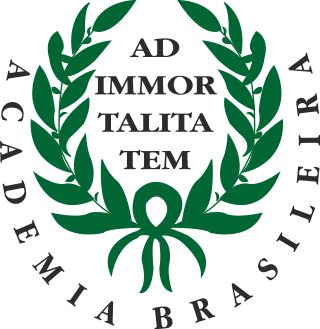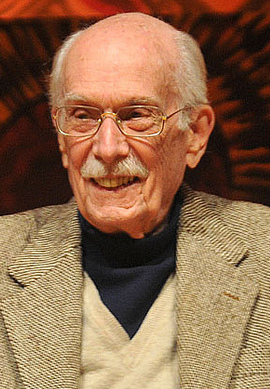Related Research Articles

The Academia Brasileira de Letras is a Brazilian literary non-profit society established at the end of the 19th century. The first president, Machado de Assis, declared its foundation on Tuesday, 15 December 1896, with the by-laws being passed on Thursday, 28 January 1897. On Tuesday, 20 July of the same year, the academy started its operation.

Guarani Futebol Clube, colloquially called Guarani, is a Brazilian association football club in Campinas, São Paulo. Guarani is the only club not based in a state capital or coastal city to have won the top tier of the Brazilian Championship. The team currently play in the Série B, the second tier of Brazilian football, as well as in the Campeonato Paulista Série A1, the top tier of the São Paulo state football league.

Lygia Fagundes da Silva Telles was a Brazilian novelist and writer. Educated as a lawyer, she began publishing soon after she completed high school and simultaneously worked as a solicitor and writer throughout most of her career. She was a recipient of the Camões Prize, the highest literary award of the Portuguese language and her works have received honors and awards from Brazil, Chile and France. She was elected as the third woman in the Brazilian Academy of Letters in 1985 and held Chair 16.

Antonio Candido de Mello e Souza was a Brazilian writer, professor, sociologist, and literary critic. As a critic of Brazilian literature, he is regarded as having been one of the foremost scholars on the subject by Brazilian universities. He was the co-winner of the Prêmio Jabuti for essays in 1965 and was awarded the Prêmio Machado de Assis in 1993, the Camões Prize in 1998, and the Alfonso Reyes International Prize in 2005.

The creation of art in the geographic area now known as Brazil begins with the earliest records of its human habitation. The original inhabitants of the land, pre-Columbian Indigenous or Natives peoples, produced various forms of art; specific cultures like the Marajoara left sophisticated painted pottery. This area was colonized by Portugal in the 16th century and given the modern name of Brazil. Brazilian art is most commonly used as an umbrella term for art created in this region post Portuguese colonization.

The Roman Catholic Archdiocese of São Luís do Maranhão is a Latin archdiocese in Brazil.

The roots of Brazilian sculpture have been traced back to the late 16th century, emerging soon after the first settlements in the newly discovered land. Through the following century, most of the sculpture in Brazil was brought from Portugal and displayed Baroque features. The Baroque style would flourish within the religious culture of the country and would remain predominant until the first decades of the 19th century. In the 19th century, sculptural activity decreased, but it later revived when both the government and the public took a new interest in the art. Modernism fomented a period of intense research into a new language of sculpture, with great achievements, and the contemporary sculpture of Brazil enjoys worldwide respect.
Pedra sobre Pedra is a Brazilian telenovela co-produced by TV Globo (Brazil) and RTP (Portugal). It aired in Brazil from 6 January to 31 July 1992, with 179 episodes.

The Cinemateca Brasileira is the institution responsible for preserving Brazilian audiovisual production. In July 2021, it experienced a major fire.
Fundamentos was a cultural and literary magazine published in São Paulo, Brazil, from 1948 to 1955. The magazine was close to the Brazilian Communist Party.
O Semideus is a Brazilian telenovela produced and broadcast by TV Globo. It premiered on 22 August 1973 and ended on 7 May 1974, with a total of 221 episodes in Black and white. It's the thirteenth "novela das oito" to be aired on the timeslot. It is created and written by Janete Clair and directed by Walter Avancini and Daniel Filho.
O Casarão is a Brazilian telenovela produced and broadcast by TV Globo. It premiered on 7 June 1976 and ended on 10 December 1976, with a total of 168 episodes. It's the seventeenth "novela das oito" to be aired on the timeslot. It is created and written by Lauro César Muniz and directed by Daniel Filho and Jardel Mello.
Cultura Política was a political and cultural magazine based in Rio de Janeiro, Brazil. It was one of the cultural apparatuses developed by the Estado Novo to diffuse the official ideology to the whole Brazilian society. It was in circulation between 1941 and 1945.
Problemas was a monthly political magazine published in Rio de Janeiro, Brazil. It was subtitled Revista Mensal de Cultura Política. The magazine was first published in August 1947. It was the official media outlet of the Brazilian Communist Party and was published by its central committee. Diogenes Arruda who was a member of the Communist Party's national secretary was the editor of the magazine. It included only translations of the articles from communist magazines without covering the events in Brazil. The magazine ceased publication in 1957.

Maria Beatriz do Nascimento, known as Beatriz Nascimento, was an Afro-Brazilian academic and activist. She was an influential participant of the Black Movement of Brazil from its beginnings in the 1960s until her death. Through her academic research, she evaluated the importance of quilombos as autonomous spaces for people of African descent during the colonial period and challenged the political environment and racial policies of the government toward Afro-Brazilians. Her scholarship on the invisibility of black women, and particularly non-Anglo women of the African diaspora had an international impact on research regarding the complexities of the black experience and lack of attention focused on Afro-Latinas in transnational feminism.

Palácio dos Bandeirantes is a palace in São Paulo, Brazil. It is the seat of the São Paulo state government and the governor's official residence. The palace, located at the Morumbi district, also houses some secretaries and a wide historical and artistic exhibition open to the public.

The Institute of Brazilian Studies, is a specialized research unit of the University of São Paulo, founded in 1962 on the initiative of Professor Sérgio Buarque de Holanda. It aims to research and document the history and culture of Brazil.

Following the emergence of modern Spiritualist events in Hydesville, New York, United States, via the mediumship of the Fox sisters (1848), the phenomena quickly spread to Europe where, in France, the so-called "turning tables" became a popular fad. In France, this type of phenomenon, in 1855, caught the attention of the educator Hippolyte Léon Denizard Rivail. As a result of his research, he published the first edition of The Spirits' Book, under the pseudonym "Allan Kardec". The foundation of the Spiritist doctrine is contained in this book and four others published later: The Mediums' Book, 1861; The Gospel According to Spiritism, 1864; Heaven and Hell, 1865; The Genesis According to Spiritism, 1868. These combined books are called the "Kardecist Pentateuch".
Gilda Rocha de Melo e Sousa, also spelled Gilda Rocha de Mello e Souza, was a Brazilian philosopher, literary critic, essayist, and university professor.
References
- 1 2 3 4 José Mindlin; Cristina Antunes (2006). "Brasiliana: Published Works and Collections". In Carmen Nava; Ludwig Lauerhass (eds.). Brazil in the Making: Facets of National Identity. Lanham, MD: Rowman & Littlefield. p. 86. ISBN 978-0-7425-3757-6.
- 1 2 Ismail Xavier (November 2012). "Presence of Paulo Emilio". Revista Pesquisa. Archived from the original on 2 January 2017. Retrieved 20 November 2016.
- 1 2 Peter H. Rist (2014). Historical Dictionary of South American Cinema. Lanham, MD: Rowman & Littlefield Publishers. p. 506. ISBN 978-0-8108-8036-8.
- 1 2 Heloisa Pontes (2009). "Ar de família: a turma de Clima". Literatura e Sociedade (in Portuguese) (12): 62. doi: 10.11606/issn.2237-1184.v0i12p62-73 .
- ↑ Heloisa Pontes (2003). "Cities and intellectuals: the Partisan Review "new yorkers" and the Clima "paulistas," between 1930 and 1950". Revista Brasileira de Ciências Sociais. 18 (53). doi: 10.1590/S0102-69092003000300003 .
- ↑ "Antonio Candido (1918-)". Brown University. Retrieved 20 November 2016.